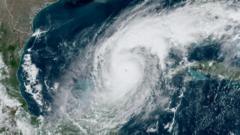Facing visa revocation and the threat of deportation due to his involvement in pro-Palestinian protests, Momodou Taal decided to leave the US, joining a growing number of international students targeted by the Trump administration's immigration policies.
Cornell Student Leaves the US Amid Deportation Fears Tied to Protests Against Israel

Cornell Student Leaves the US Amid Deportation Fears Tied to Protests Against Israel
Momodou Taal, a graduate student at Cornell University, voluntarily departs the US over concerns about deportation following his anti-Israel protest activities.
A graduate student at Cornell University, Momodou Taal, has opted to leave the United States rather than face deportation linked to his anti-Israel protest activities. Taal, a joint citizen of the UK and The Gambia, had his student visa revoked amid rising tensions during the Israel-Gaza conflict. His decision marks a significant moment in the ongoing crackdown on international students who publicly express dissent against US foreign policy.
Taal had previously sought legal recourse to prevent his deportation but ultimately concluded that his safety and freedom to voice his beliefs were at significant risk. On social media platform X, he articulated his frustrations, stating, "Given what we have seen across the United States, I have lost faith that a favourable ruling from the courts would guarantee my personal safety and ability to express my beliefs." His comments reflect a broader climate of anxiety among students who are targets of US immigration enforcement.
Cornell University, an Ivy League institution located in upstate New York, suspended Taal multiple times for his participation in protests. His public statements, including declarations of solidarity with resistance movements, have drawn scrutiny from US immigration authorities. Reports indicate that under the Trump administration, at least 300 other international students have faced similar visa revocations for their involvement in pro-Palestinian demonstrations, emphasizing the administration's stern stance on perceived threats to national security and foreign policy interests.
Marc Rubio, the Secretary of State, underscored that the Immigration and Nationality Act provides grounds for deportation of non-citizens who engage in activities viewed as adversarial to US interests. Critics of these deportations argue that they constitute violations of free speech and academic freedom.
Another international student, Ranjani Srinivasan, who also departed the US over such controversies, expressed a desire to clear her name, asserting she is simply a student and not a supporter of terrorism. She hopes to return to Columbia University and resume her PhD studies.
As these deportations continue, they raise critical questions about the balance between national security and the rights of students to express their political beliefs freely. The repercussions of these policies and their chilling effect on academic discourse remain at the forefront of discussions in educational institutions across the country.





















